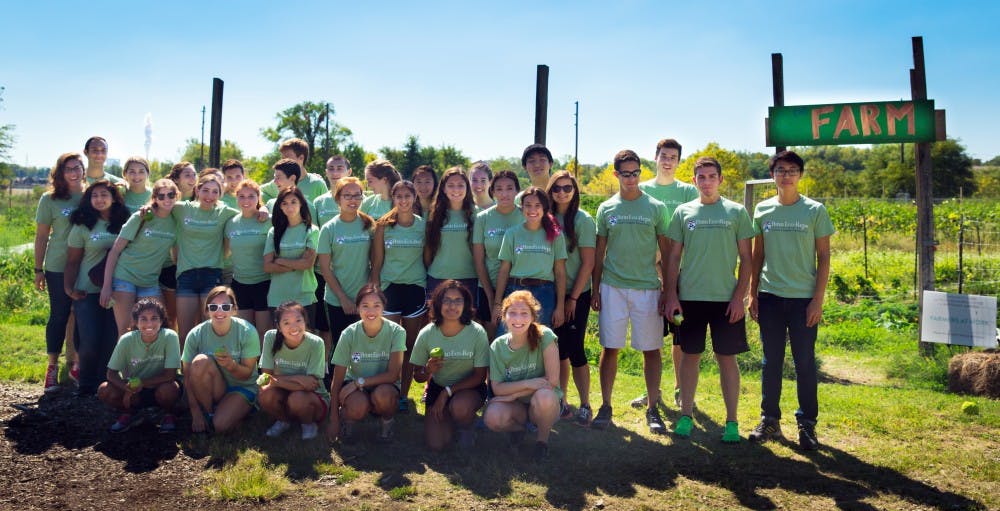From turning off the lights to coordinating zero-waste Penn Athletics events, Penn’s team of student Eco-Reps works to promote environmental consciousness throughout the entire Penn community.
Penn Eco-Reps is an environmental leadership program run by the Office of Sustainability at Facilities and Real Estates Services that advances environmental sustainability across campus. “Penn has one of the bigger Eco-Rep programs in the country,” Sustainability Outreach Manager Julian Goresko said. “Our development has been based on the trend in higher education for peer-to-peer outreach programs to promote sustainability.”
Penn’s Eco-Reps program began as an initiative in college houses, but has grown to encompass other campus communities. Approximately 60 student Eco-Reps are spread across the College House, Athletics, Hillel and Greek organizations.
“One of the things that makes the Eco-Reps program unique among all the other great environmental groups on campus is that Eco-Reps is the only one in an official partnership with an office of the University,” Goresko said. Members of the Office of Sustainability are able to work directly with students on a daily basis through the Eco-Reps program. “We give our students funding to have sustainable events that raise awareness throughout the whole campus,” Goresko said.
FRES does not release budgetary numbers for matters like the Eco-Reps program.
Funding given to Eco-Reps goes to more than just zero-waste events and free efficient light bulbs. “Last year we had a speaker come from Israel who gave a series of lectures on Jewish values and sustainability that a large number of students attended,” said Engineering junior and Hillel Eco-Rep Ariana Schanzer.
Funding also goes towards food at educational events, signage and stickers as incentives to foster education and environmental consciousness. “A lot of it is little things — these little details that work to get people curious,” College senior and Athletics Eco-Rep Samuel Ruddy said. “Also to organize passionate and able volunteers.”
The largest branch of the student Eco-Reps program is the College House system. “Mostly we focus on increased sustainability within the college houses,” said College sophomore and Gregory Eco-Rep Tabeen Hossain. “In Gregory, for example, we have gotten people to bring their own plates to events — we’re trying to change people’s mindsets on sustainability and keep waste from generating.”
Hossain is an environmental studies major and said her experience as an Eco-Rep is a nice way stay involved and make an impact at Penn.
Schanzer started her involvement with Hillel sustainability as an ambitious freshman. “We saw that the Jewish community was a large section of Penn that wasn’t involved much in environmental issues or sustainability, and it’s been great to be a part of a group involved in changing that,” Schanzer said.
“People at Hillel have said to me that they formed a religious connection through environmentalism,” Schanzer said. “It’s been great to know that I could make a profound impact like that through the program.”
College junior Dustin Klein became a Greek Eco-Rep last year for Sigma Phi Epsilon after hearing about the program from his fraternity brothers. “When I became an Eco-Rep for my house, I definitely put our money to good use ... and I have been very keen about keeping our chapter’s house eco-friendly,” Klein said.
Klein is also an environmental studies major and said that Eco-Reps allows him to pursue his passion for environmental sustainability. “I think that the little things anyone can do in their lives — whether it’s just promoting recycling or refilling water bottles — can go a long way,” he said. “I’m really happy to a part of the executive board for Greek Eco-Reps next year.”
Athletics Eco-Reps face different challenges. “We have a lot of high-waste events to manage and make sure that those are sustainable,” Ruddy said. “I first joined as a volunteer for the Palestra’s zero-waste events and one of our biggest goals is for those sustainable events to become the default.”
“After my four years on a team, it’s really rewarding to know that I’m doing something to help Penn Athletics become better and more sustainable for the future in whatever way I can,” Ruddy said.
“It’s easy to focus on how Eco-Reps help to make the campus greener,” Goresko said. “But we see a lot of value in students enriching their Penn experience through the program and getting to do sustainability work that they are so passionate about.”
Recruitment for the Eco-Reps program is held every fall for the College House system and each semester for the Hillel, Greek and Athletics systems. “We look for specific students who we think are going to be successful at behavior change, outreach and education,” Goresko said. “We have an online application ... because it’s important for us to make sure that the student’s interests really dove-tail with ours.”









